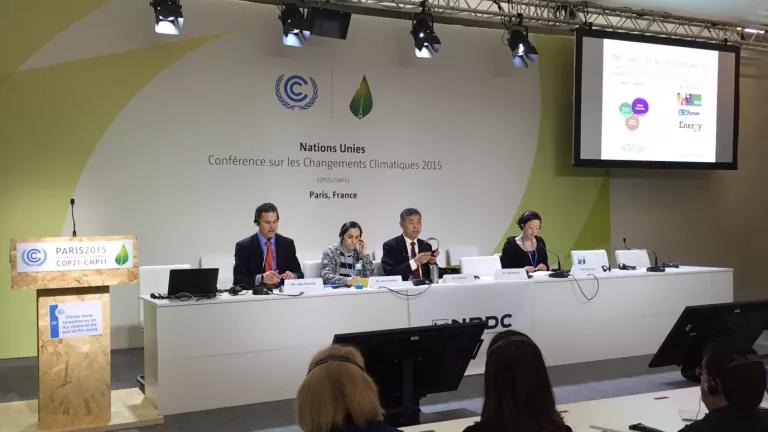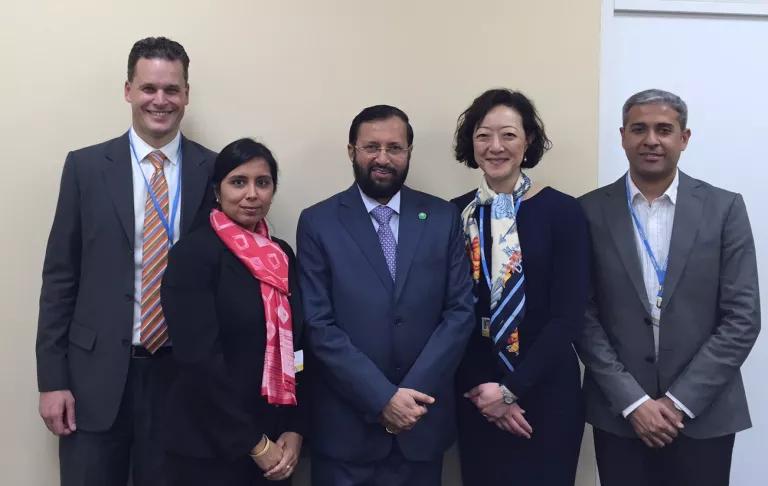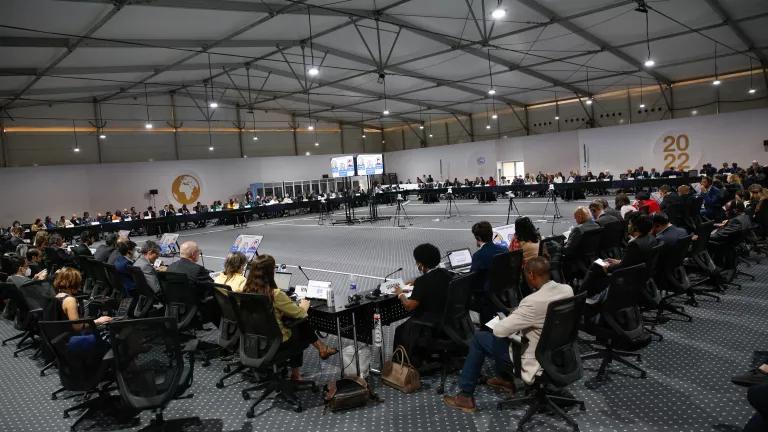
Co-authored by NRDC's Nehmat Kaur, Meredith Connolly & Anjali Jaiswal
In the final push to secure an achievable and durable climate agreement in Paris, country negotiators are working hard to reach consensus on strong mitigation and adaptation action to curb global warming and avoid the worst predicted impacts. During the NRDC side event on "Global Climate Action: Perspectives on Major Energy Initiatives in China, India and the United States," NRDC President Rhea Suh noted the growing lines and wait time for espresso within Le Bourget as a sign of negotiators determined to work around the clock to achieve a historic agreement this week.
As the remaining challenges in the text are resolved over these next two days, the Paris summit is the single biggest opportunity for countries such as India, China and others to solidify their leadership and commitment to developing clean energy economies on low carbon growth pathways. Powering growth in a more resilient way can shift the emissions trajectory to avoid the worst impacts of climate change, provide millions of local, clean jobs and lift millions out of poverty. This agreement can help deliver justice and adaptation tools to those living on the climate change frontlines already. Providing examples of major climate initiatives from a multi-stakeholder perspective during NRDC's side event today, leaders from China, India and the United States highlighted a coal consumption cap in China, expansive renewable energy growth and energy efficiency measures in India, and the Clean Power Plan in the U.S.
What's at stake in Paris
Cities around the world are facing the threats of climate change. The poorest are also the most vulnerable to these threats. The Marshall Islands and other island nations are facing a serious existential threat of sea-level rise. Just this past week, the world has seen India's fourth largest city of Chennai lose more than 300 lives to a record rainfall and subsequent flooding. Earlier this year, India lost more than 2,300 lives during one of the world's deadliest heat waves. 19 out of the 20 hottest years on record have happened in the last two decades.
On the sidelines of the Paris climate summit, NRDC and partners hosted a discussion to put in perspective the need for building community resilience against such threats of climate change. After lead India negotiator Ajay Mathur spoke of India's clean energy progress and need for greater resilience measures, NRDC former president Frances Beinecke and CDKN CEO Sam Bickersteth released the "City Resilience Toolkit: Response to Deadly Heat Waves and Preparing for Rising Temperatures" as a way to support communities to prepare against extreme heat. United States Secretary John Kerry announced that the United States will be doubling funding for adaptation activities from now to 2020.
Coupled with the need to manage the unavoidable threats already posed by climate change is the need to mitigate the causes of global warming to avoid even greater impacts in the future. At today's side event, President Rhea Suh described the Clean Power Plan as the centerpiece of America's commitment to combat climate change and move off a destructive development path. It sets the first national limits in the U.S. on carbon pollution from power plans, and embraces renewable energy and energy efficiency to power America's future. Junfeng Li, Director-General of the National Development and Reform Commission of China, described how the national coal cap policy to curb coal use will provide enormous air quality and health benefits to the public and coal industry workers.
With most of the country's infrastructure yet to be built and a huge energy deficit, India presents perhaps the single largest opportunity for establishing a low carbon development path. Renewable energy is at the heart of India's climate pledge, aiming for 40% of non-fossil fuel based power by 2030 along with 175 gigawatts of renewable energy installed by 2022 (read India's full INDC here). As Jake Schmidt, NRDC's International Program Director, made clear, COP21 is not just about international and national level action. Climate leadership and action by cities and businesses are also critical to shifting the world towards a more sustainable way forward.
Developing countries are already bearing the brunt of carbon intensive growth strategies. People in Beijing and New Delhi are choking from alarmingly high levels of air pollution in their cities. As Junfeng Li stated, instead of comparing whose air is worse, both Beijing and New Delhi need to take serious climate action to reduce the deadly problem. Dr. Ritu Mathur of TERI highlighted air pollution as a critical issue to tackle, and praised India's focus on solar energy in its climate plan. Moving to clean non-fossil fuel based renewable energy will help alleviate some of the challenges that developing economies are facing, while providing millions of jobs.
Moving the needle on the climate agreement
Negotiators are striving toward a strong, transparent and durable global agreement with individual countries taking ambitious climate action until 2030. Three key issues remain to achieve a transparent, accountable and well-financed climate agreement in Paris:
- Transparency: The text needs to reflect openness among the more than 180 countries, including regular reporting on emissions and climate action, and allowing expert review. This transparency should also ensure flexibility and differentiation as countries meet their domestic targets.
- Taking of stock: Countries are still debating the timing of when countries will take stock on what domestic climate action has happened and whether it can be strengthened. It remains to be agreed to whether this taking of stock will start in 2017, 2020, or 2022. This is in addition to, and not to be confused with the "stock taking" provision for countries to reassess their goals every 5 years between now and 2030 and step-up their efforts along the way to put us on a safer climate trajectory.
- Climate Finance: Many developing countries have indicated they could significantly reduce emissions beyond their domestic pledges if they were provided with monetary support. Significant finance for adaptation efforts is also essential since the impacts of climate change are already being felt in communities that have contributed the least to this crisis, including in India. The following three finance-related issues are being discussed:
- Whether countries can go beyond the targeted annual $100 billion climate finance goal by 2022, creating a launching pad for further investment.
- Whether a progression and ramp up in climate finance will be mobilized over time to ensure needed support for countries to meet and exceed their nationally determined climate goals.
- How to carve a role for needed private sector investment in addition to the public funds promised. Enabling this private finance is critical to supporting burgeoning clean energy markets in countries like India.
Highlights of India's leadership

Minister Prakash Javadekar of the Indian Environment, Forest and Climate Change met with NRDC President Rhea Suh, International Program Director Jake Schmidt and NRDC India's Anjali Jaiswal and Bhaskar Deol earlier in COP21. The NRDC team congratulated India on its domestic climate actions to curb global warming. India has committed to ambitious clean energy targets domestically and is leading on the formation of the International Solar Alliance - a collaborative alliance that has invited more than 120 solar-rich countries to facilitate knowledge and technology transfer, financial investments and skill development to launch solar markets globally. India is also prioritizing adaptation strategies to build capacity for vulnerable groups to better withstand the impacts of climate change.
India and other developing countries have a significant opportunity here. Reaching a universal agreement and leading a low carbon growth pathway among developing countries would be a significant win for India on the global stage. India can benefit by accessing available climate finance to grow its economy sustainably with energy efficient, clean technology while providing jobs, increasing energy access and alleviating poverty. Achieving an ambitious climate agreement will accelerate the shift to cleaner, more sustainable and more equitable development in India.



